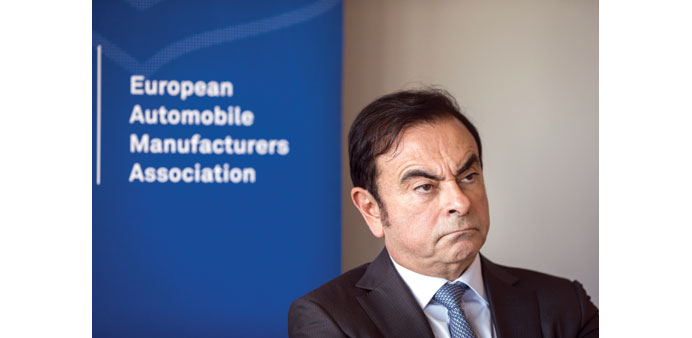Carlos Ghosn, chief executive officer of Nissan Motor Co and Renault, reacts during a news conference in Brussels, Belgium, on Friday. Renault remains on collision course with its biggest shareholder in a dispute running since April, when French Economy Minister Emmanuel Macron raised the government’s stake in the car maker to boost its corporate clout.
Prepares to shield Nissan from Paris, say sources; little progress in talks with government; Renault warned against ceding control of Nissan
Reuters
Paris
Renault is drawing up proposals to relinquish some power over its partner Nissan, sources said, and is shoring up support ahead of a likely boardroom clash with the French government.
Renault remains on collision course with its biggest shareholder in a dispute running since April, when French Economy Minister Emmanuel Macron raised the government’s stake in the car maker to boost its corporate clout.
Since its 1999 rescue by Renault, Nissan has outgrown its French partner and under the combined leadership of chief executive Carlos Ghosn, the Renault-Nissan alliance has become the world’s fourth biggest carmaker by sales.
Nissan now leads in a number of areas such as engineering projects and Renault is pursuing closer integration with its Japanese partner, in which it holds a 43.3% controlling stake. The French state wants to safeguard its strategic interests, which include preserving jobs at home, and raised its stake in Renault April to ensure it would get double voting rights as a long-term shareholder under French law.
The car making alliance wants to shield Nissan from possible increased French influence in the future and it has been at loggerheads with the government, which has two representatives on Renault’s board.
With board-level negotiations making little headway, Renault is preparing to make good on threats to weaken its grip on Nissan, people with knowledge of the matter said.
“There’s nothing that comes close to an agreement,” a source close to the alliance said. “It’s as if the government wants to find out whether it’s a bluff.”
Macron has warned Ghosn against making any moves to loosen Renault’s control of Nissan, or its leadership of the alliance.
“Any unravelling or weakening of the links between the two companies cannot be a solution,” he said in a newspaper interview published on Sunday.
Renault-Nissan declined to comment.
Macron spent €1.2bn ($1.3bn) of public money to raise France’s stake in Renault to 19.7% to block a Ghosn proposal for the company to opt-out of the law giving long-term shareholders double voting rights.
Even after the government’s holding is pared back to 15% as planned, France will command a blocking minority when the Florange law takes effect at the end of March next year.
The minister on Sunday reiterated a compromise offer, first reported by Reuters, to limit the exercise of its additional voting rights to strategic questions.
But Renault’s proposal is likely to go much further, sources said, neutralising its control in Nissan with a binding pledge not to interfere in management — as demanded by the Japanese carmaker on November 30 — along with restrictions on government votes.
As a safeguard, Nissan wants to be authorised to increase its 15% stake in Renault if the promise is broken. If the holding reaches 25%, Renault could in turn lose the votes on its Nissan shares under Japanese law.
In a sign that Macron may have given some ground, French officials privately acknowledge that any last-minute compromise would likely require a Renault-Nissan deal adjusting the relationship defined in a 2002 alliance master agreement.
But any steps to end Renault control in Nissan will meet stiff resistance, according to people familiar with government thinking.
“That’s not going to cut any ice,” said one. “With all the fuss they’ve made, Renault-Nissan have mainly succeeded in putting the state at the very centre of their alliance.”
Besides Ghosn, the 19-member Renault board consists of 10 independent directors, who have so far backed the CEO, four workers’ representatives, two Nissan appointees and two French government officials.
Macron has demanded that Ghosn and both Nissan appointees abstain from voting to avoid conflicts of interest, sources say.
The independents, including Danone chairman Franck Riboud and Total’s Thierry Desmarest, have also been heavily criticised by French officials for betraying Renault — a charge they rebuffed in an unusual group statement last month.

